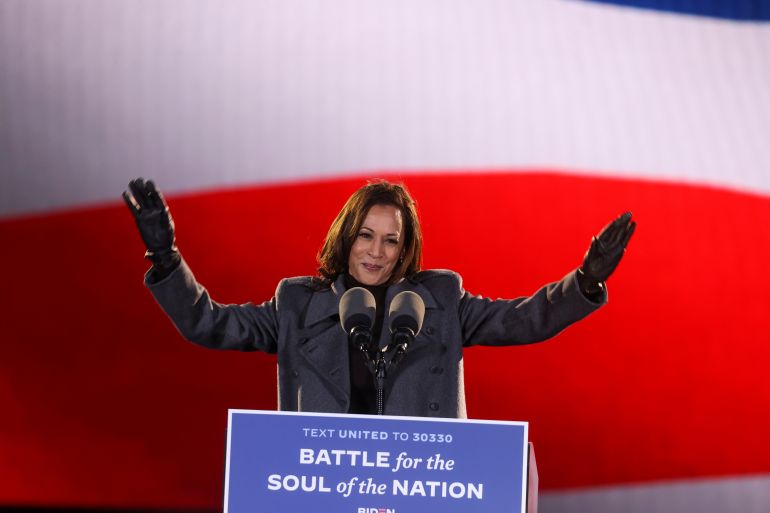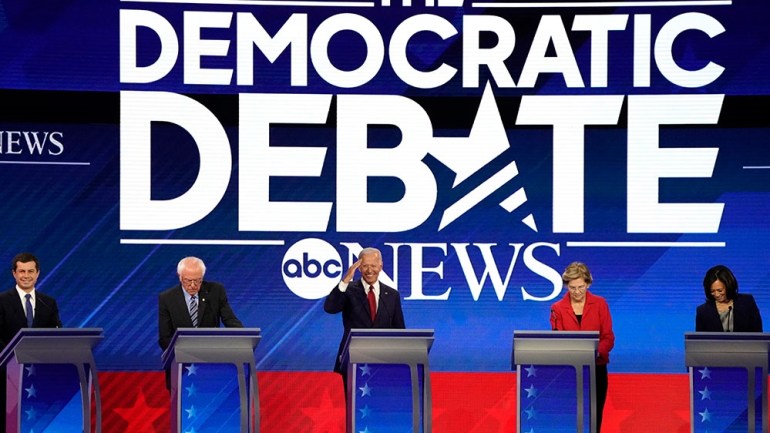Kamala Harris makes history as first ‘Madam Vice President’
Harris will become the first Black and South Asian woman to take the office, the latest in a career of firsts.

Kamala Harris is projected to become the first woman, person of colour and of Asian descent to hold the position of vice president-elect.
Harris and her running mate, President-elect Joe Biden, look set to take up residence in the White House, with a projected 290 Electoral College votes so far. Georgia, North Carolina and Alaska have yet to declare winners, but the Democratic ticket has surpassed the 270 votes needed to win.
Keep reading
list of 4 itemsTrump ally Rudy Giuliani files for bankruptcy following defamation case
‘Insurrection’ should bar Donald Trump from US presidency, lawyers argue
Ex-Proud Boys leader Joseph Biggs sentenced to 17 years for US Capitol riot
US President Donald Trump has not conceded the election and said in a statement on Saturday that “Biden is rushing to falsely pose as the winner”. The Trump campaign has filed several lawsuits to challenge poll outcomes across the US and the president said more will come on Monday.
“This election is about so much more than @JoeBiden or me,” Harris said on Twitter. “It’s about the soul of America and our willingness to fight for it. We have a lot of work ahead of us. Let’s get started.”
She also shared a brief video of her call with Biden after the announcement. “You’re going to be the next president of the United States,” she said.
We did it, @JoeBiden. pic.twitter.com/oCgeylsjB4
— Kamala Harris (@KamalaHarris) November 7, 2020
Harris, a first-term senator from California, comes from a family of immigrants. Her mother was Shyamala Gopalan, an Indian who came to the US to work as a biologist and researcher. Her father, Donald J Harris, came from Jamaica to study at Stanford University, where he received a PhD in economics.
That makes Harris, who was already the first Black woman from California to serve in the Senate, the first female, Black and Indian person to hold the office.
Road to the White House
Harris’s heritage appealed to Biden’s campaign, which hoped it would help raise enthusiasm with voters of colour. Her reputation as an effective fundraiser was also a factor: Biden’s campaign raised nearly $11m in the first four hours after Harris was announced as his running mate.
Biden, who will be 78 when assumes office, has intimated he will be a one-term president, making Harris a presumptive successor.
The former California senator was seen as a frontrunner when she entered the presidential contest in 2019.
Harris also served as California’s top prosecutor, giving her time in court to hone her skills as a tough questioner.
She used this to her advantage, grilling controversial Supreme Court Justice Brett Kavanaugh, a Trump appointee, during Senate confirmation hearings in 2018. The questioning won Harris popularity among liberals.
As the only Black woman who entered the crowded fray of the Democratic primaries, Harris rocked Biden during a debate, questioning his record on desegregation via school busing.
She also joined left-wing leader Senator Bernie Sanders in calling for universal healthcare, or Medicare for All.

Harris then retreated right on the issue, which is popular in the US, according to various polls. This, coupled with a perceived lack of firm policy commitments, lead to her exit from the race to be the Democratic nominee before the Iowa caucus in February.
Biden selected Harris as his running mate on August 11. Her name had been floated as a potential pick for months.
Biden said she was “a fearless fighter for the little guy, and one of the country’s finest public servants” in a tweet announcing his pick.
I have the great honor to announce that I’ve picked @KamalaHarris — a fearless fighter for the little guy, and one of the country’s finest public servants — as my running mate.
— Joe Biden (@JoeBiden) August 11, 2020
During the campaign, analysts agreed Harris handled herself well in a debate with Vice President Mike Pence and her speeches at public events went without controversy.
But the pick was viewed by some as a message to the Sanders wing of the party that Biden would aim for the political centre.
Progressives questioned her tenure as California’s attorney general and her retreat on universal healthcare.
Though Harris described herself as a “progressive prosecutor” in a 2019 memoir and said it is a “false choice” to decide between supporting the police and advocating for greater scrutiny of law enforcement, others have denied the claim.
Lara Bazelon, director of the Criminal Juvenile Justice and Racial Justice Clinical Programs at the University of San Francisco School of Law, wrote an opinion piece for the New York Times entitled “Kamala Harris Was Not a ‘Progressive Prosecutor’”.
After she was named Biden’s running mate, Bazelon spelled out her concerns on Democracy Now, including that Harris’s “office fought tooth and nail to uphold wrongful convictions, that in some cases kept innocent people in prison”.
Still, Harris weathered the criticism to rise to an office that sits one heartbeat away from the presidency, and her tenure as vice president will mark another first in her career.
